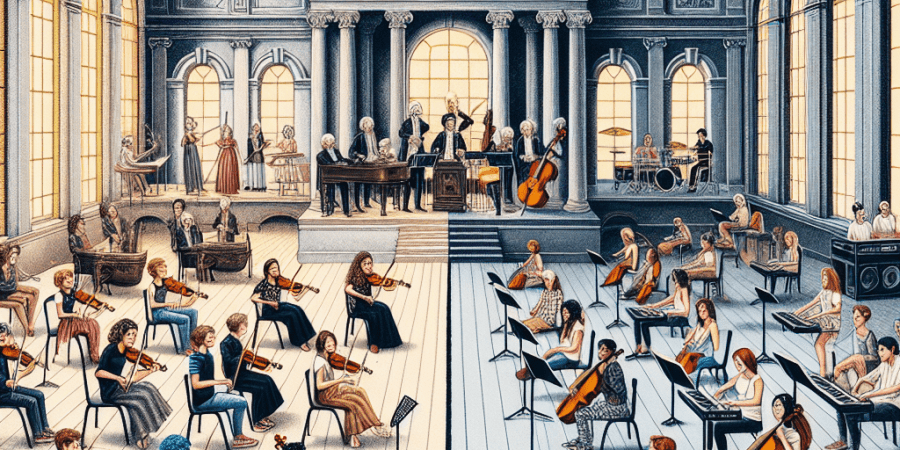A Comparison of Music Education: Classical Conservatories vs. Modern Music Schools
If you’ve ever dreamed of dazzling audiences as a world-class musician, or simply want to improve your musical abilities, you’re likely debating between attending a classical conservatory or a modern music school. Both have rich histories and offer unique benefits, but which is the right choice for your musical journey? In this blog, we’ll compare classical conservatories and modern music schools to help you make an informed decision.
What is a Classical Conservatory?
Classical conservatories have a prestigious and long-standing tradition of music education. Nestled in the heart of cultural hubs, these institutions emphasize classical music genres such as orchestral, operatic, and chamber music.
- Tradition and Prestige: Many conservatories boast centuries-old histories and have produced some of the most renowned musicians in the world.
- Specialization: Students often receive rigorous training in a specific instrument or vocal performance.
- Networking Opportunities: The alumni network and connections within the classical music world can be invaluable for future careers.
Think of a classical conservatory like Hogwarts for musicians—magical, intense, and steeped in tradition (minus the flying broomsticks and potions, of course).
What is a Modern Music School?
Modern music schools, on the other hand, offer a broader and more contemporary approach to music education. These institutions cater to a variety of genres, including jazz, rock, pop, and electronic music.
- Versatility: Students can explore multiple genres and styles, often within the same program.
- Technology Integration: Emphasis on modern production techniques, recording software, and digital instruments.
- Industry Connections: Partnerships with record labels, music producers, and other industry professionals.
Think of modern music schools as the cool, laid-back cousin who knows all the latest trends and technology. They’re the places where you might run into the next big pop star or hear the future of music being created in a studio.
Curriculum Differences
The curriculum is one of the most significant differences between classical conservatories and modern music schools.
Classical Conservatories
- Core Focus: Emphasis on music theory, history, and classical performance techniques.
- Performance:** Frequent recitals, ensemble performances, and masterclasses with distinguished musicians.
- Rigorous Training: Intensive practice schedules and high expectations for technical proficiency.
Picture your day filled with hours of scales, arpeggios, and dissecting Beethoven’s symphonies note by note. Fitness might be a second priority, considering all the finger exercises you’ll be doing!
Modern Music Schools
- Eclectic Curriculum: Courses in songwriting, music business, sound engineering, and live performance.
- Hands-On Experience: Real-world projects such as recording sessions, gigs, and collaborations with other artists.
- Innovation and Creativity: Encouragement to experiment with different genres and sounds.
Imagine blending a mashup of jazz improvisation, a rock guitar solo, and some electronic beats, all while learning how to market your music on social media. It’s multitasking at its finest!
Career Paths and Opportunities
Your choice between a classical conservatory and a modern music school can also influence your career trajectory.
Classical Conservatories
Graduates from classical conservatories often pursue careers as:
- Orchestra musicians
- Concert soloists
- Opera singers
- Music educators
Formal, elegant, and traditional—with perhaps a lifetime of tuning your craft (and your instrument) to perfection.
Modern Music Schools
Modern music school graduates have a plethora of career options, such as:
- Recording artists
- Music producers
- Songwriters
- Sound engineers
- Music entrepreneurs
This path opens doors to an industry that’s as dynamic as the playlists on your streaming service. The sky’s the limit!
Making Your Choice
When choosing between a classical conservatory and a modern music school, consider the following questions:
- What genre of music are you passionate about?
- What are your career aspirations in the music industry?
- What type of learning environment suits you best?
- How important are tradition and prestige versus innovation and versatility?
Ultimately, both types of institutions offer valuable, albeit different, experiences. Your choice will depend on your personal goals and musical preferences. Whether you choose the time-honored path of a classical conservatory or the varied and contemporary approach of a modern music school, rest assured that you’re investing in an enriching future. Happy practicing!
Got a story to share about your musical education journey? Drop a comment below! Let’s keep the conversation melodious and lively. 🎶
